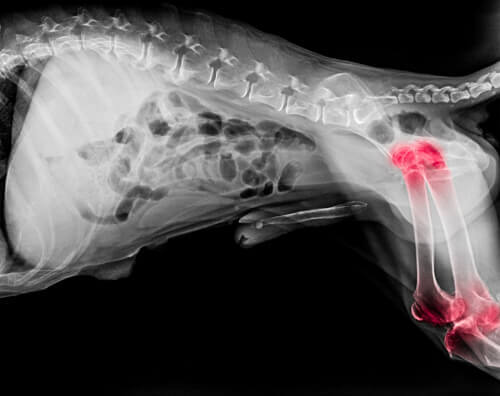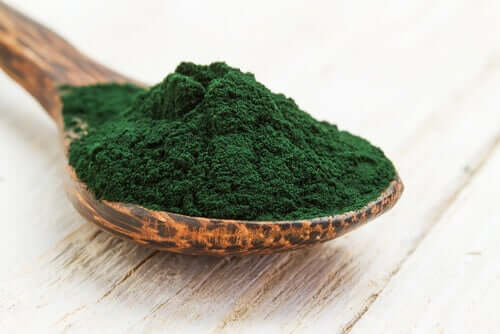Spirulina Supplement - Five Health Benefits for Dogs

You must be aware of the impact that a spirulina supplement can have on your dog’s health. This way you’ll be able to decide whether to introduce it into their diet or not. So, read today’s article to find out more about the many properties of these algae.
Spirulina is a bluish-green spiral-shaped alga. This plant is capable of living in both fresh and saltwater and requires considerable exposure to bright sun. This is the reason why it grows at a very fast rate.
The five health benefits of a spirulina supplement for dogs
You can buy this ingredient at your local health market in powder form. It’s a convenient way to use it in your everyday life as it easily dissolves in any liquid. Here are the 5 most important benefits of spirulina:
It facilitates digestion
Modern pet food isn’t always wholesome and often leads to problems in their digestive system. This is when taking a spirulina supplement on a regular basis comes in handy. This is because it prevents the fungi and bacteria that accumulate in the animal’s intestine. The chlorophyll in these algae is a natural cleanser so it also helps improve the immune system.
Generally, a dog’s system can easily absorb all of the nutrients in these algae. So, the animal’s intestinal transit doesn’t have to work as hard to obtain them.
Anti-inflammatory
A great health benefit of spirulina for dogs is due to phycocyanin, the anti-inflammatory substance that reduces pain. This is particularly helpful when a dog has any injuries or has recently undergone surgery.
These algae are also a natural remedy against arthritis and they greatly improve a dog’s daily routine. Likewise, they don’t have the disadvantages of synthetic anti-inflammatories, such as damaging the liver.
Spirulina is a top-notch dietary supplement

You should consider adding spirulina to your pet’s diet for optimal nutrition as it’s a source of many proteins, minerals, vitamins, fiber, and many other components that’ll certainly improve their health.
Even more, if the animal is malnourished either because they’re recovering from a disease, because they lost too much weight or because they haven’t got an appetite, then just a very little amount can give them the energy they need.
It protects the liver
Thanks to the presence of chlorophyll and phycocyanin, there are many health benefits of spirulina for your dog’s organs. For instance, it improves liver function and eliminates toxins more efficiently.
Also, kidneys will greatly benefit from this supplement due to its antioxidant power that helps them eliminate toxins from the body. This results in a better state of health and delays aging.
Can help to prevent cancer
Cancer is one of the most lethal diseases these days. So, you must do your best to prevent it. Spirulina has properties that can help to prevent the onset of this disease; through its phycocyanin, more specifically.
This substance slows down the reproduction of cancer cells and promotes the growth of T cells, which are responsible for destroying malignant cells. In addition, spirulina can promote the regeneration of damaged cells if your dog already has cancer and is currently undergoing radiation treatment.
Spirulina supplement – the adequate dose

The daily amount of spirulina needed to attain all these health benefits is actually very small due to its high concentration. Nutritionists recommend that you buy the organic kind to make sure it doesn’t contain any other substances.
The recommended dose is 1/8 of a teaspoon for every 11 pounds of weight. It’s always a good idea to start with a smaller amount so that the organism of your animal, especially their digestive system, adapts to the spirulina. Then, if it all goes well, you can begin to increase the dose.
All cited sources were thoroughly reviewed by our team to ensure their quality, reliability, currency, and validity. The bibliography of this article was considered reliable and of academic or scientific accuracy.
- Soy un perro. Propiedades de la Espirulina en perros. 20 de septiembre de 2017. Extraído de: https://soyunperro.com/espirulina-para-perros/
- Puro menu. Spirulina. El super alimento natural verde para tu perro o gato. 12 de septiembre de 2018. Extraído de: https://puromenu.es/blogs/dieta-barf-puroblog/19403971-spirulina-el-super-alimento-natural-verde-para-tu-perro-o-gato
- Mi perro come BARF. 7 Beneficios de la Spirulina para perros y gatos. 30 de julio de 2019. Extraído de: https://miperrocomebarf.com/7-beneficios-spirulina-para-perros-y-gatos/